I know many of you who read this blog believe as I do that the 7 day period of time during which the Passover, the Feast of Unleavened Bread, and First-fruits are celebrated were given by YHWH as a prophetic shadow pictures (divine appointments) of the redemptive work of Yeshua at Calvary.
From my understanding of the Biblical record the Reed Sea crossing is a picture of the Resurrection. This is alluded to in some of the passage quote below.
For those of you who believe that Israel’s crossing the Reed Sea was a picture of the resurrection and that this prophetic shadow picture took place at the Gulf of Aqaba, I am genuinely interested in how you see those events playing out chronologically.
As Paul told the Corinthians without the resurrection our faith is vain. If Israel’s crossing over the Reed Sea was a picture of their salvation and served as a prophetic type for Yeshua’s resurrection and mankind’s salvation, how is that event justified as a prophetic type if it took place outside the “mow’ed” or divine appoint of 7 day Feast of Unleavened Bread?
My chart tonight shows a chronological comparison of both events. It’s not perfect but it gives a good idea of some of the challenges involved. I leave you tonight with some Scriptural references for further reflection starting with the words of Paul to the Corinthians. The rest of the references are below the chart. Your thoughts and opinions are welcomed.
Now if Christ be preached that he rose from the dead, how say some among you that there is no resurrection of the dead? But if there be no resurrection of the dead, then is Christ not risen: And if Christ be not risen, then is our preaching vain, and your faith is also vain. Yea, and we are found false witnesses of God; because we have testified of God that he raised up Christ: whom he raised not up, if so be that the dead rise not….. (1 Corinthians 15:12-15)
Our fathers understood not thy wonders in Egypt; they remembered not the multitude of thy mercies; but provoked him at the sea, even at the Red sea. Nevertheless he saved them for his name’s sake, that he might make his mighty power to be known. He rebuked the Red sea also, and it was dried up: so he led them through the depths, as through the wilderness. And he saved them from the hand of him that hated them, and redeemed them from the hand of the enemy. (Psalm 106:7-10)
FREE BOOK DOWNLOAD
For I delivered unto you first of all that which I also received, how that Christ died for our sins according to the scriptures; And that he was buried, and that he rose again the third day according to the scriptures:… (1 Corinthians 15:3-4)
But now is Christ risen from the dead, and become the firstfruits of them that slept. For since by man came death, by man came also the resurrection of the dead. For as in Adam all die, even so in Christ shall all be made alive. But every man in his own order: Christ the firstfruits; afterward they that are Christ’s at his coming. (1 Corinthians 15:20-23)
Else what shall they do which are baptized for the dead, if the dead rise not at all? why are they then baptized for the dead? (1 Corinthians 15:29)
Blessed be the Lord God of Israel; for he hath visited and redeemed his people, And hath raised up an horn of salvation for us in the house of his servant David; As he spake by the mouth of his holy prophets, which have been since the world began: That we should be saved from our enemies, and from the hand of all that hate us; To perform the mercy promised to our fathers, and to remember his holy covenant; The oath which he sware [Shaba] to our father Abraham, (Luke 1:68-73)
But God commendeth his love toward us, in that, while we were yet sinners, Christ died for us. Much more then, being now justified by his blood, we shall be saved from wrath through him. (Romans 5:8-9)
Moreover, brethren, I would not that ye should be ignorant, how that all our fathers were under the cloud, and all passed through the sea; And were all baptized unto Moses in the cloud and in the sea; And did all eat the same spiritual meat; And did all drink the same spiritual drink: for they drank of that spiritual Rock that followed them: and that Rock was Christ. (1 Corinthians 10:1-4)
Know ye not, that so many of us as were baptized into Jesus Christ were baptized into his death? Therefore we are buried with him by baptism into death: that like as Christ was raised up from the dead by the glory of the Father, even so we also should walk in newness of life. For if we have been planted together in the likeness of his death, we shall be also in the likeness of his resurrection: (Romans 6:3-5)
They forgat God their savior [yasha], which had done great things in Egypt; Wondrous works in the land of Ham, and terrible things by the Red sea. (Psalm 106:21-22)
But after that the kindness and love of God our Saviour toward man appeared, Not by works of righteousness which we have done, but according to his mercy he saved us, by the washing of regeneration, and renewing of the Holy Ghost; Which he shed on us abundantly through Jesus Christ our Saviour. (Titus 3:4-6)
Buried with him in baptism, wherein also ye are risen with him through the faith of the operation of God, who hath raised him from the dead. (Colossians 2:12)
For Christ also hath once suffered for sins, the just for the unjust, that he might bring us to God, being put to death in the flesh, but quickened by the Spirit: By which also he went and preached unto the spirits in prison; 20 Which sometime were disobedient, when once the longsuffering of God waited in the days of Noah, while the ark was a preparing, wherein few, that is, eight souls were saved by water. The like figure whereunto even baptism doth also now save us (not the putting away of the filth of the flesh, but the answer of a good conscience toward God,) by the resurrection of Jesus Christ: (1 Peter 3:18-21)
For I delivered unto you first of all that which I also received, how that Christ died for our sins according to the scriptures; And that he was buried, and that he rose again the third day according to the scriptures:… (1 Corinthians 15:3-4)
Now if Christ be preached that he rose from the dead, how say some among you that there is no resurrection of the dead? But if there be no resurrection of the dead, then is Christ not risen: And if Christ be not risen, then is our preaching vain, and your faith is also vain. Yea, and we are found false witnesses of God; because we have testified of God that he raised up Christ: whom he raised not up, if so be that the dead rise not….. (1 Corinthians 15:12-15)
But now is Christ risen from the dead, and become the firstfruits of them that slept. For since by man came death, by man came also the resurrection of the dead. For as in Adam all die, even so in Christ shall all be made alive. But every man in his own order: Christ the firstfruits; afterward they that are Christ’s at his coming. (1 Corinthians 15:20-23)
Else what shall they do which are baptized for the dead, if the dead rise not at all? why are they then baptized for the dead? (1 Corinthians 15:29)

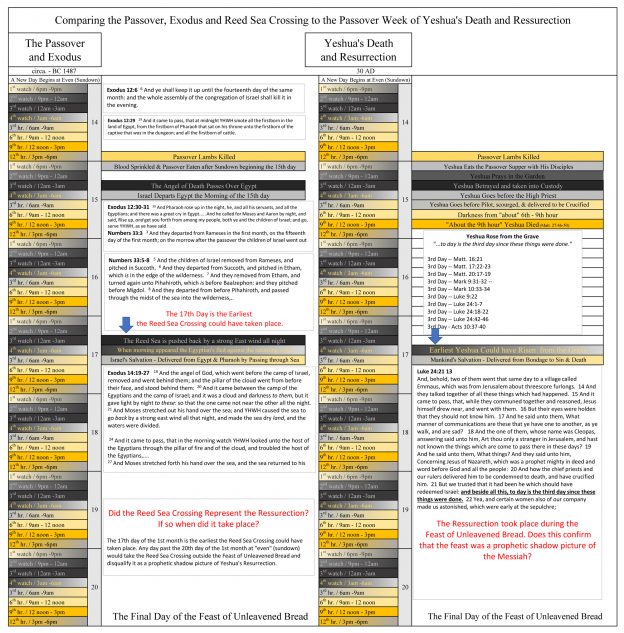
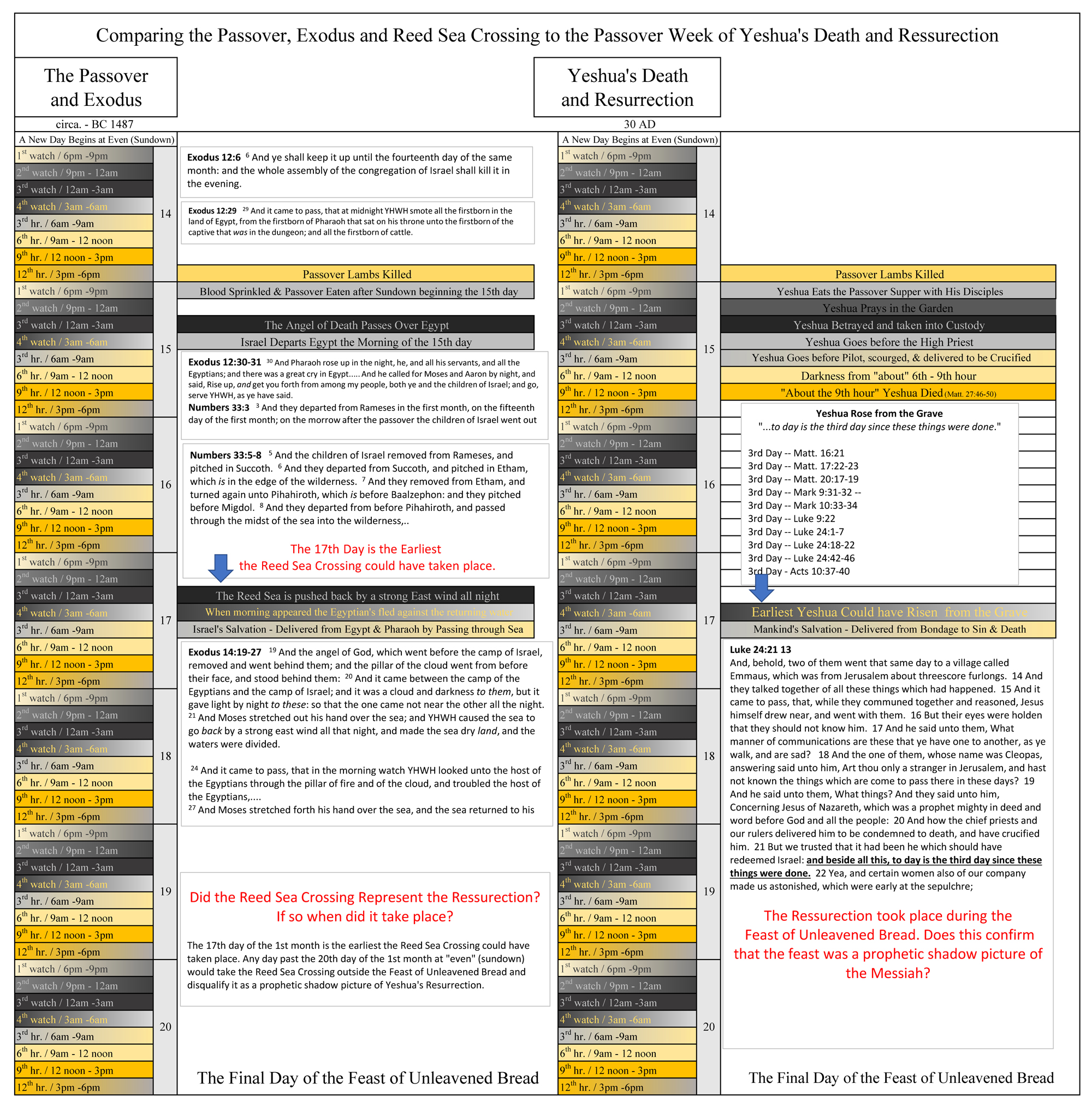
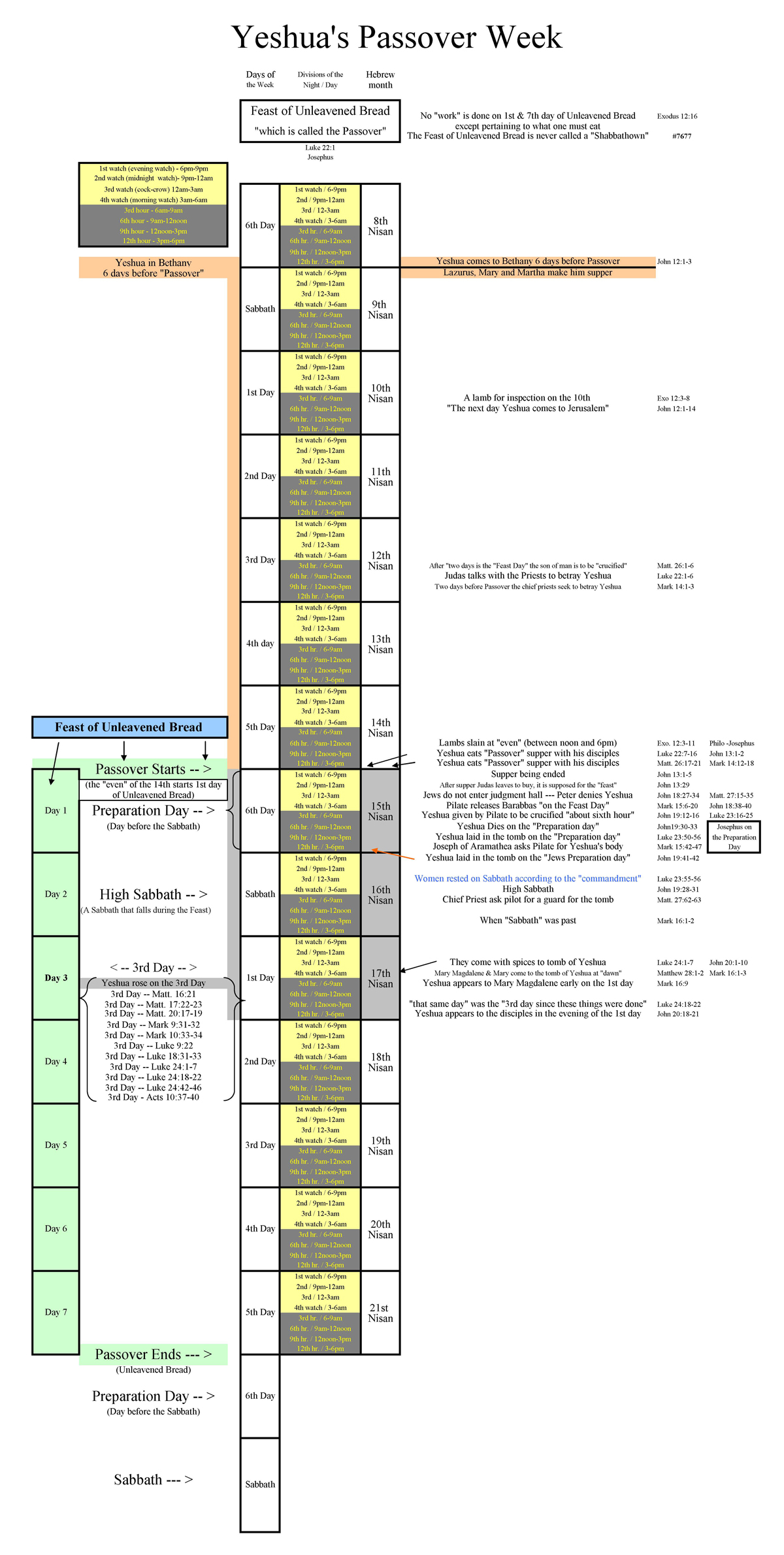
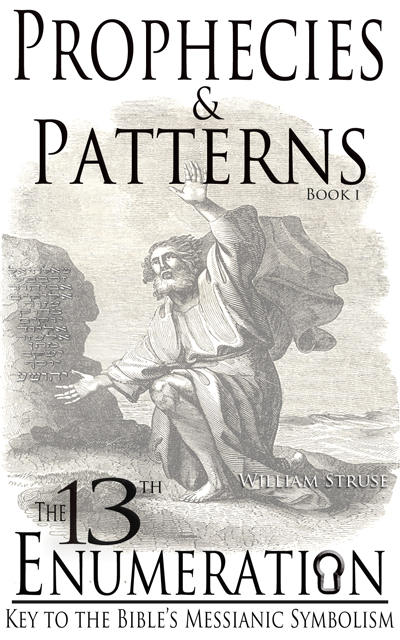
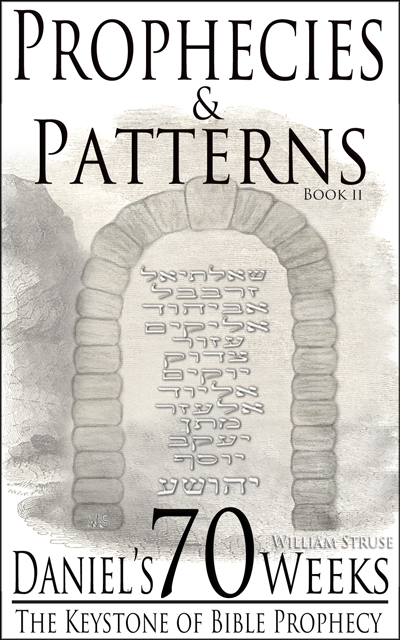
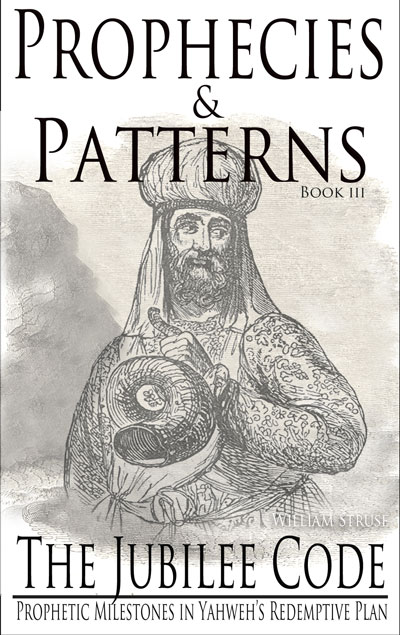
There were two “Sabbaths”
The “day” begins at sundown and ends at sundown. Therefore the 14th of Nisan began at sundown on the 13th. Christ and the disciples kept the Passover ON Passover at the beginning of the “day” at EVEN.
Christ was crucified on THE PASSOVER the 14th. (a Wednesday) Died and was put in the tomb BEFORE the 1st Day of Unleavened Bread which is the HIGH DAY. (15 Nisan) After that Thursday which was the HIGH DAY was the preparation day for the weekly Sabbath (a Friday) At the end of the weekly Sabbath (Saturday) and early on the 1st day of the week (Sunday) the women went to the tomb and HE WAS ALREADY RISEN. Wed at even-SAT at even is 3 days and 3 nights. As is fitting..Christ was resurrected on the Sabbath which depicts the celebratory rest of God and man.
Good evening Raymond,
Thank you for your comments. I’ll try to respond in some detail this weekend when I have more time.
Regards,
William
Good evening Raymond,
Here is how I understand the subject currently.
First of there were not two “Shabbaths” during the Feast of Unleavened Bread (UB). For good reason the Feast of Unleavened Bread is never called a Sabbath in the Hebrew Scriptures. While regular work is prohibited on the 1st and 7th day of Unleavened Bread, Exodus 12:16 specifically allows for work related to food preparation. Therefor UB cannot rightly be called a Sabbath (a total cessation from work).
Exodus 12 is very clear about what transpired. The lambs were kept up to the last part of the 14th day of the month, they were killed on the 14, blood was posted on the doors of there house, and lambs were then eaten just a short time later in the evening the 15th. Israel was required to eat the Passover in immediate readiness for departure. That night of the 15th, the angel of death passed over Egypt killing the first born and then in the morning of the 15th Israel departed Egypt.
The Feast of Unleavened Bread is a memorial – it commemorated the actual events. The Passover lambs are not killed on the 13th and the Passover supper has never been eaten at the start of the 14th of Nisan.
The Passover has always been kept at the start of the 15th of the month and the supper officially begins the 7 day feast of Unleavened Bread which the Bible clearly states is from the 14th at “even” until the 21st at “even”. Again as described below the lamb is kept until the 14th day of the month, then killed in the evening, and then eaten with unleavened bread on the night of the 15th. Remember Unleavened Bread is only eaten for 7 days. From the 14th at even (start of the 15th) until the 21st at even (the start of the 22st day of the month).
This is further confirmed in Leviticus where it states the Passover is on the 14th at even and the Feast of Unleavened Bread on the 15th “day” of the month.
Finally regarding the “High Day”. This cannot refer to the 1st or 7th day of Unleavened Bread because again these days are not “Sabbath’s”. Indeed most work is prohibited but work related to the preparation of food is allowed. The “high day” of John 19:31 specifically refers to the “Sabbath day” which fell during the 7 day Feast of UB. The “preparation” day can only refer to the 6th day of the week. No preparation day is required for the day preceeding the start of UB because work related to the preparation of food is allowed.
John 19:31 then proves that Yeshua was crucified on the 6th day of the week. Please see the following charts and their references for further details. Hope this helps clarify my understanding of the subject.
Warm regards,
William
Hello William,
Enjoy your work and the love you have for the Word.
I hope I’m helping you fine tune your timeline by pointing out what I see is the length of days of Unleavened Bread. It is not a 7 day feast the way you described, but an 8 evening feast.
You wrote: “Remember Unleavened Bread is only eaten for 7 days. From the 14th at even (start of the 15th) until the 20th at even (the start of the 21st day of the month).
But Ex 12:18 says it’s from the 14th ‘even’ until the the 21st ‘even’. That’s 8 evenings long the way I see it.
Hope this helps,
Rick Vallozzi
Hi Rick,
Thank you for pointing that out. Could you tell me where you got the quote from. I tried to find it to correct it but could not. Was it in the chart per chance? That quote should have read – – Remember Unleavened Bread is only eaten for 7 days. From the 14th at even (start of the 15th) until the 21st at even (the start of the 22nd day of the month).
Here are a couple of charts I hope help clarify my understanding. I’ve included the a chart showing how Yom Kippur on the 10th day of the month is specifically described as beginning on the 9th at “even”- from “even unto even”. This shows that when the “even” of a particular day is mentioned it designates the end of that day and the beginning of the next.
Warm regards,
William
Leviticus 23:5-6
5 In the fourteenth day of the first month at even is the YHWH’S passover. 6 And on the fifteenth day of the same month is the feast of unleavened bread unto YHWH: seven days ye must eat unleavened bread.
Exodus 12:15-20
15 Seven days shall ye eat unleavened bread; even the first day ye shall put away leaven out of your houses: for whosoever eateth leavened bread from the first day until the seventh day, that soul shall be cut off from Israel. 16 And in the first day there shall be an holy convocation, and in the seventh day there shall be an holy convocation to you; no manner of work shall be done in them, save that which every man must eat, that only may be done of you. 17 And ye shall observe the feast of unleavened bread; for in this selfsame day have I brought your armies out of the land of Egypt: therefore shall ye observe this day in your generations by an ordinance for ever. 18 In the first month, on the fourteenth day of the month at even, ye shall eat unleavened bread, until the one and twentieth day of the month at even. 19 Seven days shall there be no leaven found in your houses: for whosoever eateth that which is leavened, even that soul shall be cut off from the congregation of Israel, whether he be a stranger, or born in the land. 20 Ye shall eat nothing leavened; in all your habitations shall ye eat unleavened bread.
William, your quote is located in the middle of your reply to Raymond on April 8th just before the block of scripture marked Exodus 12:6-8. Your chart looks fine.
Also, from what you’ve shown in your reply to me, this means that Yom Kippur is not a 24hr observance, but a 30hr observance. And Passover/UB is one week and 6hrs long.
Thank you Rick. I appreciate you pointing out the error.
Regards,
William
“Last plague began Passover, Abiv 15, Sunday. ended Abiv 21, when they rested at sea, Sabbath Day. Began with death Firstborn, ended with death charioteers. This was very first week of ‘Unleavened Bread’….” p 123 http://biblechronologybooks.com/scientificmethod.html
Thank you Larry.
I’m always amazed at your insight and love your books! Please understand that this is only my opinion and I very well could be wrong, but offer this food for thought. I see Yeshua’s Passover Week a little differently than your chart shows. I believe that Yeshua was actually in the grave for two Sabbaths; one is the High Sabbath of the first day of Unleavened Bread and the other is the weekly Sabbath, which I believe did not fall on the same day on the week that He died. It is my belief that Yeshua had to be raised from the dead on the third Feast which is the Feast of First Fruits because 1 Cor. 15:20 tells us that He became the “first fruits of those who are asleep”. The problem that arises is how the Feast of First Fruits is calculated. Many people put this day on the 16th Day of Nisan. Leviticus chapter 23 tells us that Passover is the 14th day of Nisan, the first day of Unleavened Bread is the 15th day of Nisan, but it does not ever give us a specific date for the Feast of First Fruits. Instead, it says that the priest shall wave the sheaf (of First Fruits) before YHWH on the “day after the Sabbath”. I believe that this is the weekly Sabbath, not the Sabbath of the first day of Unleavened Bread. (This would also be why Shavuot or Pentecost does not have a specific date attached to it since we have to count from First Fruits). So, this is how I see the death and resurrection of Yeshua:
14th day of Nisan: 4th day of the week (corresponds to our Wednesday that year-Passover) Yeshua is crucified and buried before sundown
15th day of Nisan: 5th day of the week (Thursday-High Sabbath for Feast of Unleavened Bread) Yeshua is in the grave and the women cannot buy spices on this day because it is a Sabbath.
16th day of Nisan: 6th day of the week (Friday) Yeshua is in the grave and the women buy and prepare the spices since this day is not a Sabbath.
17th day of Nisan: 7th day of the week (Saturday-Sabbath) Yeshua is in the grave until sundown and the women rest according to the commandment
18th day of Nisan: 1st day of the week (Sunday-Feast of First Fruits) the women bring the spices very early in the morning and He had already risen (probably the night before).
This timing helps to see how Yeshua could be the “sign of Jonah”. For 3 days and 3 nights He was in the grave just as Jonah was in the belly of the fish. I do know that the argument for many is that He has to rise “on” the third day which is why so many people have His death on Friday and resurrection on Sunday, but if you’ll notice that there are Scriptures that also say that He will rise “after” 3 days (Mark 8:31), so these must be equivalent expressions, I think.
This timing also helps to make sense of the Scriptures talking about the women buying and preparing the spices. Mark 16:1 explains that when the Sabbath HAD PASSED, they bought spices. Luke 23:56 says that they prepared the spices and then rested on the Sabbath day according to the commandment. That’s because there were two Sabbaths. They could only purchase the spices on a day in between the two Sabbaths because there is no buying or selling on a Sabbath day.
Again, this is only my opinion, but I associate the crossing of the Reed Sea on the third Mo’ed (Feast Day), which is the Feast of First Fruits, which also corresponds to the third day of creation where the waters were gathered and dry land appeared and this Feast Day can vary on a calendar after Passover and Unleavened Bread, depending on when the weekly Sabbath falls. Sorry this was so long and forgive me if this topic has already been addressed somewhere else on your blog.
Good evening T.,
Thank you for your comments and your kind words. I really appreciate the spirit in which you offer your thoughts. I’ve never really minded if someone disagree with me or challenges me. I often learn more from those who see things differently than me. Even if we don’t ultimately agree, maybe our discussion will help others to better understand the complexities and challenges of subject. I look forward to responding to you. Hopefully I’ll be able to address you comments in some depth this weekend.
Warm regards,
William
Good evening T.,
Thank you again for your humble attitude in reply to my post. I certainly don’t have it all figured out and surely some of those things I believe to be correct now will be refined in the future.
Here is my current understanding of the subject. Please accept it in the same gracious spirit that you offered your thoughts.
I don’t believe there is two Sabbaths during the 7 day Feast of Unleavened Bread (UB). For good reason the Feast of Unleavened Bread is never called a Sabbath in the Hebrew Scriptures. While regular work is prohibited on the 1st and 7th day of Unleavened Bread, Exodus 12:16 specifically allows for work related to food preparation. Therefor UB cannot rightly be called a Sabbath (a total cessation from work).
I agree with you that Yeshua rose on Firstfruits. My understanding is that Firstfruits begins a little jubilee countdown. In other words it begins on the 1st day of the week and ends 50 days later on the 1st day of the week for 7×7 daily Sabbath cycles.
Regarding the Sign of Jonas and the “three days and three nights in the heart of the earth” this is indeed a challenging statement. I believe if it is to be understood literally it must be balanced with the 11 instances where the New Testament state Yeshua rose on the 3rd day. Luke 24:20-21 is one of the clearest statements of chronology. It states that Yeshua was condemned to death and crucified and that “today” (1st day of the week) was the “3rd days since these things were done.”
I hope this helps you understand my position better.
Warm regards,
William
I want to thank you for taking the time to respond. You absolutely did help me to understand your position better and you taught me something I didn’t know before. Thank you! I never thought about the two days in Unleavened Bread not actually called Sabbaths. We have always observed them as Sabbaths and I’ve always been able to see the 7 Sabbaths inside the 7 Moedim. If you had asked me to give you a Scripture that calls it a Sabbath, I would have given you Mark 16:1, so you have helped me to understand the dilemma much better. This does not help me to understand, however, how the women purchase the spices after the Sabbath, yet prepare them before the Sabbath, but I do see a greater picture now. I also want to thank you for giving me the symbol of the mini-Jubilee as I count the omer this year! Again, thank you for your time and all of your studies. They are a great blessing. Tara
Hi Tara,
Here is one possible way to reconcile the accounts. Luke 23:54-24-1 tells us that towards the end of the preparation day (6th day) sometime before sundown and the start of the Sabbath (7th day), the women followed to burial procession to see where Yeshua’s body was buried. After learning of the location they then returned home and prepared spices and perfumes they had on hand in order to anoint Yeshua’s body after the Sabbath (7th day) had passed.
According to Mark 15:42-16:2 now, for whatever reason, after sundown that closed out the Sabbath (7th day), the women decided they needed more spices, so that evening (after sundown on the first day of the week), they purchased more spices and finished preparations for anointing the body of Yeshua which they were planning to do the following morning (still the 1st day of the week).
Hope that helps give you another possible solution to the chronology.
Warm regards,
William
• Mark 15:42 – 16:2 42 And now when the even was come, because it was the preparation, that is, the day before the sabbath, 43 Joseph of Arimathaea, an honourable counsellor, which also waited for the kingdom of God, came, and went in boldly unto Pilate, and craved the body of Jesus. 44 And Pilate marvelled if he were already dead: and calling unto him the centurion, he asked him whether he had been any while dead. 45 And when he knew it of the centurion, he gave the body to Joseph. 46 And he bought fine linen, and took him down, and wrapped him in the linen, and laid him in a sepulchre which was hewn out of a rock, and rolled a stone unto the door of the sepulchre. 47 And Mary Magdalene and Mary the mother of Joses beheld where he was laid.
• KJV Mark 16:1 And when the sabbath was past, Mary Magdalene, and Mary the mother of James, and Salome, had bought sweet spices, that they might come and anoint him. 2 And very early in the morning the first day of the week, they came unto the sepulchre at the rising of the sun.
• Luke 23:54 – 24:1 54 And it was the preparation day, and the Sabbath was about to begin. 55 Now the women who had come with Him out of Galilee followed after, and saw the tomb and how His body was laid. 56 And they returned and prepared spices and perfumes. And on the Sabbath they rested according to the commandment. NAS Luke 24:1 But on the first day of the week, at early dawn, they came to the tomb, bringing the spices which they had prepared.
• John 19:40-42 40 Then took they the body of Jesus, and wound it in linen clothes with the spices, as the manner of the Jews is to bury. 41 Now in the place where he was crucified there was a garden; and in the garden a new sepulchre, wherein was never man yet laid. 42 There laid they Jesus therefore because of the Jews’ preparation day; for the sepulchre was nigh at hand.
I agree with Frierson’s study of the Passion week timeline whole heartedly and with Raymond’s except for the last sentence where he says that Yeshua rose on the Sabbath/Saturday, the 7th day of the week. Yeshua’s original Resurrection Day – a Sunday, the First Day of the week, was the 8th day of the Passion week which began with Yeshua’s Triumphal Entry into Jerusalem on the colt of a donkey on the 10th of Nissan (happened to be the 1st day of the week, a Sunday which the Church labelled it as the Palm Sunday), the day the Jews chose their Passover Lamb and brought it home, took care of it till the 14th of Nissan – Exodus 12:3,6! Therefore, the Messiah could’ve resurrected right after the sundown of the Jewish Shabbat (7th day) on 18th Nissan at the very beginning of the 1st day of the week on that first original Resurrection Day or at any time of that 18th night or during the 3rd watch. We will know for sure when we meet Yeshua at Rapture. I have so many questions for Him!!
As Frierson pointed out that the Bible does not tell us the date of the Feast of the First Fruits nor the date of the Feast of Shavuot/ Pentecost. We know for sure from the Scriptures that it falls on the first day of the week (Sunday) right after the Shabbat, the 7th day (Saturday) and started counting the Omer for the Festival of Weeks (Shavuot/ Pentecost) from the First Fruits which never fails to be on a Sunday and the same goes for the Day of Pentecost/ Shavuot which always falls on a Sunday, the 50th day of the Omer (Leviticus 23:15-16).
The 7 Feasts of Jehovah given in Leviticus 23 is the Lord’s prophetic timeline or His moed or “appointed times” in fulfilling His Redemptive plan for mankind. It is the Lord’s calendar, His Timetable for the Redemption Story in real time! The Passover, when the sinless Passover Lamb of God was slain, removing the sin/leaven leading to the Feast of Unleavened bread and the Resurrection of the Feast of First Fruits. The out-pouring of the Holy Spirit was scheduled to happen (which it did) on the Feast of Shavuot/ Pentecost.
So, we must take into account the (Spring) Feasts of Jehovah – Passover, Unleavened Bread, and the First-fruits, as well as all the Scriptures in the Gospels, especially Matthew 12:40 where Yeshua specifically gives us the “sign of Jonah” of 3 days and 3 nights.
Hi Gladys,
Appreciate your comments. Please see my comments to Frierson and Raymond for a further explanation of my understanding of the chronology.
Warm regards,
William